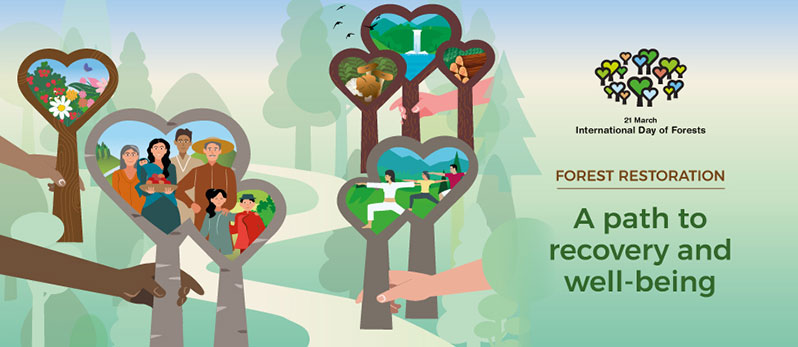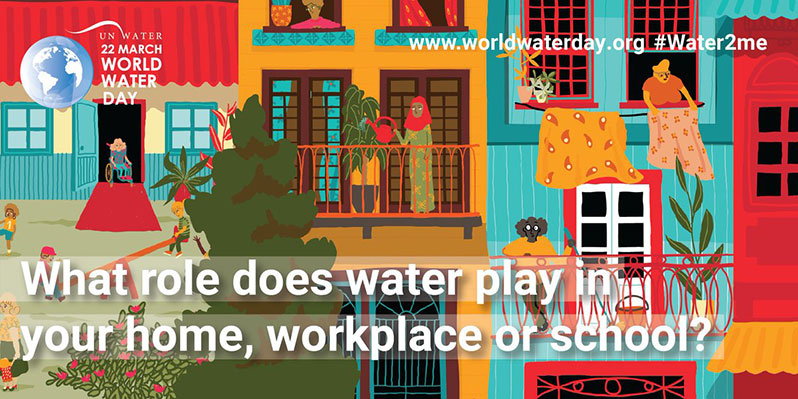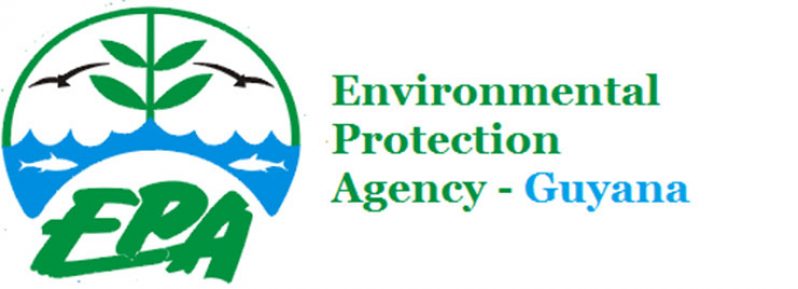ON March 21 and 22, Guyana will join the global community in observing the International Day of Forests and World Water Day. Last year, we were made aware of the inter-connectivity of forests and water. This year’s themes aim to shed light on the many values of water, as well as incorporate the International Decade of Ecosystem Restoration into observations by recognising that sustainably managed forests can be a path to recovery and well-being.
Valuing Water
Water means different things to different people. On World Water Day, we are asked how important is water to your home and family life? To your livelihood? To your cultural practices? To your well-being and your environment? The theme of World Water Day 2021 is Valuing Water. Beyond the issues of pricing, this topic includes the environmental, social and cultural value people place on water.

The value of water is much more than its price – water has enormous and complex value for our households, food, culture, health, education, economics and the integrity of our natural environment. If we overlook any of these values, we risk mismanaging this finite, irreplaceable resource. SDG 6 is to ensure water and sanitation for all. Without a comprehensive understanding of water’s true, multidimensional value, we will be unable to safeguard this critical resource for the benefit of everyone.
-In households, schools, and workplaces, water can mean health, hygiene, dignity, and productivity.
-In cultural, religious and spiritual places, water can mean a connection with creation, community, and oneself.
-In natural spaces, water can mean peace, harmony, and preservation.
Today, water is under extreme threat from a growing population, increasing demands of agriculture and industry, and the worsening impacts of climate change.
Forest restoration: A path to recovery and well-being
Whether you live in a forested area or not, these dynamic, bio-diverse rich ecosystems are essential for a healthy planet.
Healthy forests mean healthy people
Forests provide health benefits for everyone, such as fresh air, nutritious foods, clean water, and space for recreation. In developed countries, up to 25 percent of all medicinal drugs are plant-based; in developing countries, the contribution is as high as 80 percent.

Forests provide healthy diets
Indigenous communities typically consume more than 100 types of wild food, many harvested in forests. A study in Africa found that the dietary diversity of children exposed to forests is at least 25 percent higher than that of children who are not. Forest destruction, on the other hand, is unhealthy – nearly one in three outbreaks of emerging infectious disease are linked to land-use change such as deforestation.
Restoring forests will improve our environment
The world is losing 10 million hectares of forest – about the size of Iceland – each year, and land degradation affects almost 2 billion hectares, an area larger than South America. Forest loss and degradation emit large quantities of climate-warming gases, and at least 8 percent of forest plants and 5 percent of forest animals are at extremely high risk of extinction. The restoration and sustainable management of forests, on the other hand, will address the climate-change and biodiversity crises simultaneously, while producing goods and services needed for sustainable development.
Sustainable forestry can create millions of green jobs
Forests provide more than 86 million green jobs and support the livelihoods of many more people. Wood from well-managed forests supports diverse industries, from paper to the construction of tall buildings. Investment in forest restoration will help economies recover from the pandemic by creating even more employment.
Every tree counts
Small-scale planting and restoration projects can have big impacts. City greening creates cleaner air and more beautiful spaces and has huge benefits for the mental and physical health of urban dwellers. It is estimated that trees provide megacities with benefits worth USD 0.5 billion or more every year by reducing air pollution, cooling buildings and providing other services.
The availability and quality of water in many regions of the world are more and more threatened by overuse, misuse and pollution, and it is increasingly recognised that both are strongly influenced by forests. Moreover, climate change is altering forest’s role in regulating water flows and influencing the availability of water resources (Bergkamp, Orlando and Burton, 2003).

Therefore, the relationship between forests and water is a critical issue that must be accorded high priority. When we drink a glass of water, write in a notebook, take medicine for fever or build a house, we do not always make the connection with forests. And yet, these and many other aspects of our lives are linked to forests in one way or another.
Forested catchments supply a large proportion of all water used for domestic, agricultural and industrial needs. Trees and forests recycle moisture in the atmosphere through the process of transpiration to increase rainfall. The importance of forest and trees to rainfall and water supply include improvement of water cycle, reduction of runoff, improving the replenishment of the water table, filtration of water pollutants, control of floods and regulation of storm-water. Despite their importance, forests face enormous threats due to overexploitation.
Therefore, recommendations were made for sustainable water supply and rainfall through natural regeneration by land protection, aggressive afforestation, forest conservation and sound management, as well as policy formation and implementation.
Water availability has a direct impact on the health of forests and their inhabitants, which shows the importance of the relationship between forests and water. Let us continue to save the forest and stop wasting water for these two elements are critical to human and animal survival. For today and tomorrow, take some time to think about how important clean water is, and what it means to you. Think about the many services that forests offer. Let us do our part to restore our planet!
For more information on the individual observances, please visit https://www.worldwaterday.org/ and http://www.fao.org/international-day-of-forests/en/
You can share your ideas and questions by sending letters to: “Our Earth, Our Environment”, C/O ECEA Programme, Environmental Protection Agency, Ganges Street, Sophia, GEORGETOWN, or email us at: eit.epaguyana@gmail.com. Follow us on Facebook and Instagram and subscribe to our YouTube channel.



.jpg)









